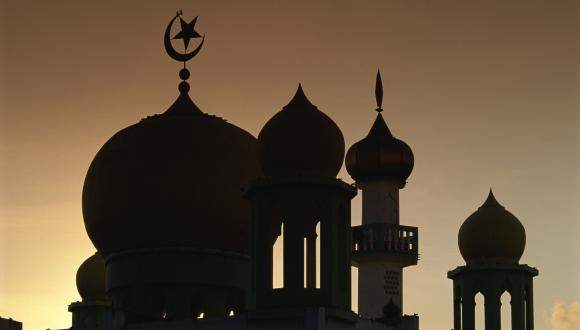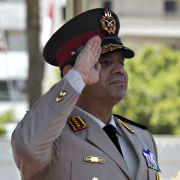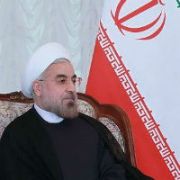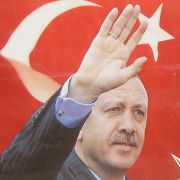The Clash Within
 The murderous attacks in Paris perpetrated by French Muslim citizens affiliated with al-Qaeda and ISIS reverberated throughout the Middle East and North Africa. Governments condemned the attacks and senior officials from numerous countries participated in the massive solidarity march in Paris with other world leaders. Numerous intellectuals, pundits and religious figures voiced their views about what had happened and why.
The murderous attacks in Paris perpetrated by French Muslim citizens affiliated with al-Qaeda and ISIS reverberated throughout the Middle East and North Africa. Governments condemned the attacks and senior officials from numerous countries participated in the massive solidarity march in Paris with other world leaders. Numerous intellectuals, pundits and religious figures voiced their views about what had happened and why.
Taken together, the various responses highlighted anew the titanic, multi-faceted clash that is taking place within the Islamic world between those who seek to reconcile their faith with modernity and those who insist on advancing “pure” versions of Islam shorn of pernicious Western influences.
Of course, political considerations are always central to the actions of governments.
Leaders from the region, beginning with Egypt’s President Abdel Fattah al-Sisi, were keen to emphasize that the fight against Islamic terrorism was a common one. Pro-government journalists in the leading Cairo daily Al-Ahram stressed that “the horror that unfolded in Paris was written in big letters on Cairo’s walls all along. We read it, but the West refused to take notice.”
Sisi framed the issue as a problem within Islam: a “revolution” in Islamic thought was needed, he declared at al-Azhar University, just a week before the Paris attack, one that would not “rely on a discourse that has not changed for 800 years… and had become a source of anxiety, danger, killing and destruction for the rest of the world.”
The Paris attacks had special resonance in North Africa, from where a large majority of France’s eight million Muslims originate, including two of the attackers and two of the victims. Moreover, thousands of North African youth, led by Tunisians, have made their way to Syria in the last four years to join jihadist ranks. Hundreds of them have already returned home, posing security challenges similar to those faced by Western governments.
Like Sisi in Egypt, the Algerian authorities have emphasized for decades that they are in the same trench and fighting the same battle as Western governments. At the same time, most North African politicians and commentators sought to distinguish between “true Islam” and the heinous actions of the terrorists, while also taking care to condemn what they viewed as the abuse of free speech to insult values deemed sacred by Muslims.
The Moroccan authorities went a step further, keeping its delegation to Paris away from the actual solidarity march since it expected that Charlie Hebdo’s controversial images of Muhammad would be displayed. From an entirely different perspective, mostly secular Amazigh-Berber associations in Morocco, Algeria and France stood in unreserved solidarity with France, and Amazigh flags were quite visible among the million marchers in Paris.
In Turkey, the reactions were decidedly mixed as befitting a country where the conflict between secular and Islamic visions of the state has been enduring. Steven Cook of the US Council of Foreign Relations called the official Turkish reaction “disturbingly equivocal,” pointing to the statement of Foreign Minister Mevlüt Çavuşoğlu, which seemed to give equal causal weight to Islamist terrorism and Western Islamophobia producing a never-ending cycle of violence.
Within the Islamist camp, there were many nuances ranging from forthright calls for self-examination to conspiracy theories postulating that French and Israeli intelligence were behind the attacks. From a different angle, the well-known commentator Soli Ozel noted that official Turkey’s reaction would have been much more forthright in years past, when the state was less Islamized, but hoped the latest events would further intensify an ongoing debate in Turkey about Islam.
President Recep Tayyip Erdoğan, however, wasted no time in accusing the West of hypocrisy, hate speech, racism and Islamophobia, while also slamming Israeli Prime Minister Benjamin Netanyahu for attending the march before he had answered for his “crimes” in Gaza. In general, Middle Eastern officials and commentators did not make mention of the explicitly targeted Jewish victims in Paris.
Some liberal Arab journalists provided trenchant, unsparing analyses of the radical Islamist phenomenon and its impact. Ghassan Charbel, editor-in-chief of the pan-Arab London-based al-Hayat daily newspaper, warned that the world is sliding toward a Third World War between the forces of moderation and those of Islamist fanaticism. His colleague Aql al-Aql stated that Western fear of Islam and Muslims was unsurprising in light of the sights of murder and throat-slitting carried out by radical Muslims. Both the Egyptian analyst Mamoun Fandy and the Iraqi writer Aziz al-Hajj called for mass demonstrations in Muslim countries against terrorism.
This coloumn ws origially published in the Mideast Monitor. The author, Dr. Bruce Maddy-Weitzman, is a Principal Research Fellow at the Moshe Dayan Center for Middle Eastern and Africam Studies, Tel Aviv University.






